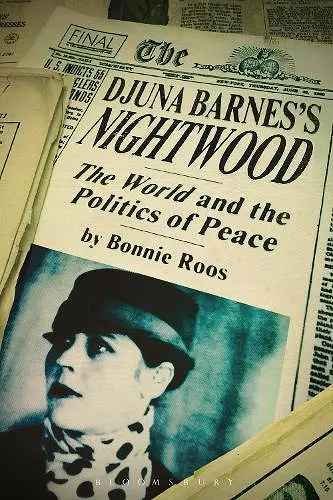Djuna Barnes's Nightwood
The World and the Politics of Peace
Format:Hardback
Publisher:Bloomsbury Publishing PLC
Published:19th Jun '14
Currently unavailable, and unfortunately no date known when it will be back

Explores the historical contexts of Barnes's masterpiece: from depression-era politics and the League of Nations to popular journalism and Modernist literary culture.
Ranging over depression-era politics, the failures of the League of Nations, popular journalism and the Modernist culture exemplified by such writers as James Joyce and T.S. Eliot, this is a comprehensive exploration of the historical contexts of Djuna Barnes's masterpiece, Nightwood. In Djuna Barnes's Nightwood: 'The World' and the Politics of Peace, Bonnie Roos reads Barnes's novel against the backdrop of Herbert Bayard Swope's popular New York newspaper The World to demonstrate the ways in which the novel wrestles with such contemporaneous issues as the Great Depression and its political fallout, the failures of the League of Nations and the collapse of peace between the two World Wars. Roos argues that Nightwood allegorizes the role of liberal newspapers - epitomised by the sensationalism of The World - in driving a US policy that hastened the arrival of war.
Nightwood, when celebrated at all, has traditionally been celebrated as a sort of sui generis glorious mess: critics are more likely to gesture toward it reverently than to engage it critically. In this entirely fresh and surprising reading, Bonnie Roos succeeds admirably in demonstrating just how carefully and cunningly wrought Barnes's novel is, and what prodigious cultural and political work it's still capable of. Roos restores to us the Nightwood that so entranced and menaced her editor T. S. Eliot, and in the process, pays tribute to the novel's ungovernable energies. * Kevin J. H. Dettmar, Professor of English, Pomona College, USA *
In her compelling new book Djuna Barnes’s Nightwood: The World and the Politics of Peace, Bonnie Roos proposes a new critical perspective on this confounding modernist work of literature and puts Barnes in the company of other brilliant modernist writers who politicized their art. Roos helpfully reads Nightwood as intentionally allegorical in order to contend with the ways in which Barnes reveals how we both make and forget our collective histories. As Roos demonstrates through her deft readings of characters whom she aligns with historical figures prominent in the US and world popular presses at the time of its writing, Barnes’s novel is much more than just an experimental, fragmented explosion of aesthetic pyrotechnics: Nightwood instead becomes a cautionary allegory of the twentieth century romance with capitalism which seems doomed to repeat itself in our twenty-first-century moment. Barnes thus, as Roos claims, asks her readers to fill in the silences predicated by dominant perspectives on history. Although she concludes that Barnes did not hold any optimistic belief that we could overcome our reliance on the hegemony of capitalism, Roos does suggest, through her carefully nuanced interpretations of the novel, that Nightwood prompts the question of how we might begin to “learn from history,…move…from reading to activism, from art to life” (29). A welcome addition to the existing scholarship on Barnes, Bonnie Roos’s argument that Nightwood can best be understood as a narrative (re)presenting subaltern experiences of history in the twentieth century secures her rightful place in the canon of literary modernism * Emily M. Hinnov, Senior Lecturer of English, Granite State College, USA *
[...] an absorbing and illuminating study of a difficult work. By situating Nightwood in the political and social history of l’entre deux guerre, Roos has changed dramatically the critical discussion about Barnes and her intriguing novel. * John Xiros Cooper, Professor of English, University of British Columbia, Canada *
ISBN: 9781472530660
Dimensions: unknown
Weight: 516g
232 pages